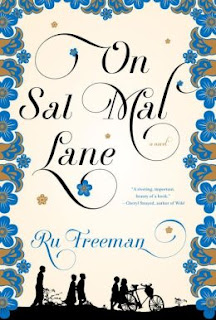On Sal Mal Lane
By Ru Freeman
Published: May 14, 2013
On the day the Herath family moves in, Sal Mal Lane is still a quiet street, disturbed only by the cries of the children whose triumphs and tragedies sustain the families that live there. As the neighbors adapt to the newcomers in different ways, the children fill their days with cricket matches, romantic crushes, and small rivalries. But the tremors of civil war are mounting, and the conflict threatens to engulf them all.
In a heartrending novel poised between the past and the future, the innocence of the children—a beloved sister and her overprotective siblings, a rejected son and his twin sisters, two very different brothers—contrasts sharply with the petty prejudices of the adults charged with their care. In Ru Freeman’s masterful hands, On Sal Mal Lane, a story of what was lost to a country and her people, becomes a resounding cry for reconciliation.
My review:
On Sal Mal Lane examines the tensions in Sri Lanka in the years leading up to the Civil War (1979-1983) through the lens of the inhabitants of Sal Mal Lane, especially the children. I found that this was a really effective way to tell the story and while there are dark times there are also moments when kids are just being kids and discovering who they are and who they hope to become. I think that helps the book to be more universal in its themes.
The novel has a third person omniscient point of view so we get to know all of the main players but it focuses on the views of the kids of Sal Mal Lane, particularly the Herath children: Suren, Rashmi, Nihil, and Devi. The story starts out with the Heraths moving into their home and the reactions of the various neighbors, most notably the Silvas who, like the Heraths, are Sinhalese Buddhists. Unlike the rest of the families on the street, the Silvas have this attitude of "us vs. them" towards those who are not Sinhalese.
While the Silvas have that negative attitude towards Tamils and anyone else not like them in ethnicity or religion, the other neighbors are mostly helpful and friendly with each other (with the exception of Sonna Bolling and occasionally his hot tempered dad). They respect each other and they all seem to love the Herath children and look out for them. It is really nice to see the sense of community in the midst of the growing strife. Some of my favorite scenes in the book involved the ways that the characters came together to celebrate a holiday or helped each other in some way. These scenes of peacefulness made the chaos and destruction of what was to come that much more jarring.
Even though the third person omniscient point of view can create a feeling of distance between the reader and the characters, I did not find that to be the case for me. I was able to connect with the story emotionally and I loved some of the characters like Devi, Raju, and Mr. Niles. Devi brought so much joy to her family and the community and Nihil was such a protective brother. The Herath kids all seemed to touch the lives of the people around them and I was particularly touched by the way Raju grew because of their friendship. Even some of the unlikable characters had depth to them which I appreciated, especially Sonna. I couldn't completely despise him because there were those moments when the reader got to see his vulnerability and pain.
I also loved the descriptions of the food, the culture, and everyday life. I did find myself consulting the glossary at the back to look up unfamiliar terms but I liked learning while I read. There is also a list of characters at the front but I wish that the author had listed which family was Sinhalese, Tamil, or Burgher as that came in to play later in the book and could be confusing to keep track of.
Though I connected with this book on a personal level, I don't think you have to be of Sri Lankan heritage to be moved by the story. Overall I thought this was an amazing book. I wish there hadn't been so much foreshadowing about certain events but other than that I really really liked it. It was an emotional reading experience for me and in a way I was sad when the story was over. I will definitely be picking up the author's other novel, A Disobedient Girl.
Now for some personal thoughts on the book:
I wanted to read this book because it was about Sri Lanka. My parents are Sri Lankan Tamils and they came to the States in the mid 1970s before the events of this story. I grew up hearing about their beautiful country without knowing much about the turmoil until I was in my teens. I remember being shocked when I first heard about the experiences of my relatives who were still in Sri Lanka during the 1983 riots. Their lives were saved by the kindness of people like the fictional Heraths.
Reading this book helped me to understand the unrest that lead to the war but it also helped me to appreciate the experiences of those who lived through those fearful times. I am glad that the author chose to portray things evenly. It wasn't just one side versus the other. There were lots of good innocent people who got caught in the crossfire between the Tigers and the military and everyone suffered. The war ended in 2009 and I am hopeful that the country will continue to heal and the peace will last.
Note: I received an ARC of this book for review through Amazon Vine but I liked the book so much that I ended up purchasing the finished version before I was halfway through



































